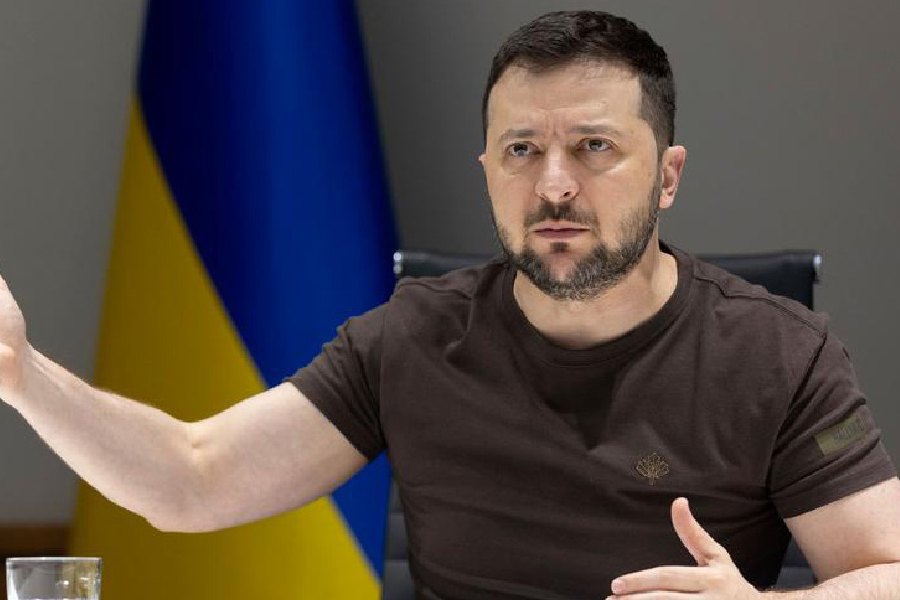It wasn’t even 8am and Captain Fritz, a Ukrainian infantry officer, had already smoked a half-dozen cigarettes.
He’s 24, but his pale blue eyes seemed older than his years, reflecting the weariness of war but also maybe something else, perhaps a flicker of mischief.
He crouched in a trench, head cocked. If he stood up, he could be easily shot by Russian snipers concealed in a thick tree line a few hundred yards away. The trench walls and mud floor shook from explosions, the steady pounding of Russian artillery that erupts each day at dawn with almost absurd regularity.
“See those bushes?” said Captain Fritz, who identified himself by his call sign, as many Ukrainian soldiers do. “That’s where some Russians are hiding. I want to wish them good morning.”
He jumped out of the trench with a grenade launcher perched on his shoulder.
“Good morning, you … !” he shouted and then let loose a succession of swear words in three languages — Ukrainian, Russian and English — before blasting the grenade.
Outnumbered, outgunned, out-tanked and nearly surrounded, a small group of Ukrainian soldiers are doing whatever they can to hold onto Marinka, a small, strategic city that has been reduced to a heap of smoking rubble and is now a few blocks from falling. The soldiers here fight house to house, room to shot-up room, so close they can hear one another’s cries for help.
All along the eastern front line, clashes are intensifying as Ukraine’s long-awaited counteroffensive to take back captured land gets underway, and some of the fiercest battles are being waged right now over a string of eastern towns — Avdiivka, Vuhledar, Chasiv Yar and Marinka.
The fate of the war turns on none of these places. Yet each matters. Even as Ukrainian forces make gains in some areas, they remain on the defensive in others. If the Ukrainians lose another town, it could be a doorway for the Russian Army to pour through.
In Marinka, the Ukrainians say the Russians have stepped up their attacks in recent days, throwing more soldiers and armoured vehicles into the fight to break through the front line. The Ukrainian forces trying to hold them back are the 79th Air Assault Brigade, better known by their nickname, “The Cyborgs”.
The Cyborg legend goes back to 2014 when longstanding tensions between Russia and Ukraine suddenly exploded in this eastern region, the Donbas, a vast, mineral-rich area on the border with Russia. The 79th Brigade was hunkered down in an airport in Donetsk, the biggest city in the Donbas, trying to fight off an onslaught by separatist proxy forces and Russian troops backing them. The airport was taking fire from all sides.
The story goes that Ukrainian officers intercepted radio traffic between the rebels and their Russian commanders saying they couldn’t believe that the Ukrainian soldiers were still fighting and that they must be “cyborgs”, half man, half machine. The name stuck, and the Cyborgs’ last stand at the Donetsk airport went down among Ukrainians as one of the early war’s most heroic battles even though they eventually lost it.
Nine years later, the Cyborgs find themselves again with their backs against the wall. Powered by patriotism, fatalism and an almost desperate bravado, along with lots of cigarettes and unhealthy energy drinks, they have been pushed back to a few smashed blocks on Marinka’s western edge.
The Ukrainians are so desperate to protect themselves from Russian shelling that when they find a house that is still standing, or at least has a few intact walls, the first thing they do is rip up the floor and dig. Building a hide-out underground is the only way to survive, they said. They live in a warren of tunnels and pulverized basements, in the dark, like moles.
“The Russians outnumber us four to one in soldiers, six to one in artillery,” Captain Fritz said. “Some of their guys are real professionals — you can see it in how they move, their tactics, how their tanks advance two by two.”
“But others,” he shook his head, “they’re just gun meat.”
“Gun meat,” he explained, was untrained Russian troops making blind assaults, whom the 79th claims to have killed in large numbers.
Marinka is, or was, a suburb of Donetsk. The city once supported schools, a museum, and a population of 10,000. Now, not a sole civilian is left. Ukrainian officials said the last holdouts had fled months ago.
As the Russians advance, they have blasted apart every apartment building, house, shed, bus stop and vehicle, reducing Marinka to a wasteland as apocalyptic as Bakhmut, the ruined city that Russian forces overtook a few weeks ago.
“Step by step, metre by metre,” said another Ukrainian soldier, who uses the call sign Hunter, “the Russians destroy the buildings in front of us. They start from the top floor and level everything. It doesn’t matter if we’re using them or not.”
The Russians assault their basement hide-outs and crawl spaces almost every day, the soldiers said. Sometimes they drop 15-pound antitank mines through gaps in the ceiling. Close-quarter combat then breaks out, bullets zipping through the underground spaces that fill with shouting and gun smoke.
“It’s normal to be afraid,” admitted another soldier, Gennadiy. “If you’re not, you’re dead.” The brigade, like others in Ukraine, would not disclose its casualty figures or even its total numbers.
New York Times News Service











